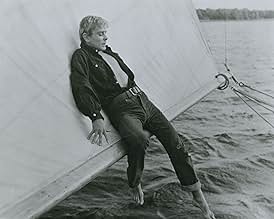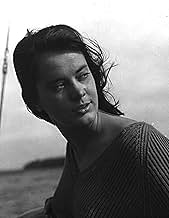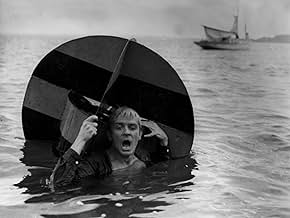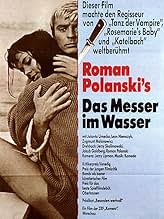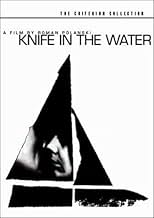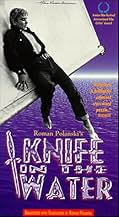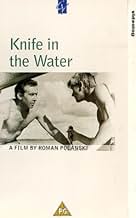CALIFICACIÓN DE IMDb
7.4/10
25 k
TU CALIFICACIÓN
Un matrimonio mayor invita a un joven autoestopista a unírseles en un viaje en barco.Un matrimonio mayor invita a un joven autoestopista a unírseles en un viaje en barco.Un matrimonio mayor invita a un joven autoestopista a unírseles en un viaje en barco.
- Dirección
- Guionistas
- Elenco
- Nominado a 1 premio Óscar
- 1 premio ganado y 2 nominaciones en total
Anna Ciepielewska
- Krystyna
- (voz)
- (sin créditos)
Roman Polanski
- Young Man
- (voz)
- (sin créditos)
Opiniones destacadas
In Polanski's feature debut, "Knife in the Water," strange power games were again to the fore, with ridiculous macho rivalries arising when a young looking man hitches a lift with a sportswriter and his attractive wife
Though the plot itself is slim, the film is distinguished by Polanski's precise visuals, which point the shifts in allegiance between the three characters through subtle groupings; impressively, although almost the whole film is situated on a small yacht, the effect is always cinematic rather than theatrical
Polanski's film is implicit, ingenious, mesmerizing, and has artistic integrity It is filled with a very different sort of suspense There is no violence The suspense is hinted at, suggested, refined tautly, glimpsed, did-he-mean-what-I-think-he-meant?
The rich man's confidence was in his possessions, among which was numbered his attractive wife, lying in bikini, teasing by arousing expectations between them on the deck The student's confidence, casual, almost unaware, was in his very being... The husband resented the youth, the strength, the "cool," the easy virility of the student and worked out a compulsion to keep challenging them, to try to show his superiority
Polanski was fair each had his own strengths and skills; but the one obsessively resented the others
Polanski's film is implicit, ingenious, mesmerizing, and has artistic integrity It is filled with a very different sort of suspense There is no violence The suspense is hinted at, suggested, refined tautly, glimpsed, did-he-mean-what-I-think-he-meant?
The rich man's confidence was in his possessions, among which was numbered his attractive wife, lying in bikini, teasing by arousing expectations between them on the deck The student's confidence, casual, almost unaware, was in his very being... The husband resented the youth, the strength, the "cool," the easy virility of the student and worked out a compulsion to keep challenging them, to try to show his superiority
Polanski was fair each had his own strengths and skills; but the one obsessively resented the others
There is nothing more thrilling than discovering a natural filmmaker for the first time. There are only so many, and you can only have menarche once. Its an introduction into another life.
I first saw this in 1965 at the Orson Welles Cinema near Harvard Square. We were told it was made behind the backs of Iron Curtain thugs, only surviving because of international attention. (I wouldn't meet Tarkovsky or Kieslowski until later.) And that it was made by the fellow who had made the striking "Repulsion," which at that time was anticipated but yet unseen in the States.
I've since learned some striking things: that both Polanski and his co-writer wanted to play the hitchhiker and indeed it is Polanski's voice. And that the mistress who seems only half alive was in fact played by a non-actress they found by looking at swimming pools. Also that the situation was suggested by a long planned and discussed Orson Welles project ("The Deep") that was started after this and never completed.
The writing is good of course, especially the central image the title denotes, but the camera finds the perfect place always. It is like Altman's camera (after this) that discovers the action rather than, say Spielberg's where the action is obviously happening in such a way to be cleanly seen by the camera. And so much harder on a boat!
But the interesting thing about such an introduction to a filmmaker is the relationship that follows: we know certain things about how he thinks and sees. We expect the conversation to continue and mature over the years. And what a rocky ride this man has taken us on, through perfectly created worlds (in which I include "Ninth Gate") but also through pure dreck and rank sentimentality (both of which tag "The Pianist").
Sometimes he's internal to the narrative, even the charmed actor. Sometimes he is outside the narrative, pulling strings (as with this film) but sometimes it is clear he never got out of bed.
As with Kubrick and so many others, you really must start at the beginning, which essentially means here.
Ted's Evaluation -- 3 of 3: Worth watching.
I first saw this in 1965 at the Orson Welles Cinema near Harvard Square. We were told it was made behind the backs of Iron Curtain thugs, only surviving because of international attention. (I wouldn't meet Tarkovsky or Kieslowski until later.) And that it was made by the fellow who had made the striking "Repulsion," which at that time was anticipated but yet unseen in the States.
I've since learned some striking things: that both Polanski and his co-writer wanted to play the hitchhiker and indeed it is Polanski's voice. And that the mistress who seems only half alive was in fact played by a non-actress they found by looking at swimming pools. Also that the situation was suggested by a long planned and discussed Orson Welles project ("The Deep") that was started after this and never completed.
The writing is good of course, especially the central image the title denotes, but the camera finds the perfect place always. It is like Altman's camera (after this) that discovers the action rather than, say Spielberg's where the action is obviously happening in such a way to be cleanly seen by the camera. And so much harder on a boat!
But the interesting thing about such an introduction to a filmmaker is the relationship that follows: we know certain things about how he thinks and sees. We expect the conversation to continue and mature over the years. And what a rocky ride this man has taken us on, through perfectly created worlds (in which I include "Ninth Gate") but also through pure dreck and rank sentimentality (both of which tag "The Pianist").
Sometimes he's internal to the narrative, even the charmed actor. Sometimes he is outside the narrative, pulling strings (as with this film) but sometimes it is clear he never got out of bed.
As with Kubrick and so many others, you really must start at the beginning, which essentially means here.
Ted's Evaluation -- 3 of 3: Worth watching.
While driving to sail with his wife Krystyna (Jolanta Umecka) in his yacht, the arrogant and wealthy Andrzej (Leon Niemczyk) "stumbles" with a drifter (Zygmunt Malanowicz) in front of his car hitchhiking on the lonely road. Andrzej gives a ride to the young man with despisal. When they reach the marina, Andrzej unexpectedly and without any reason invites the young man to sail with them, initiating a tense dispute of power with the youth, in a claustrophobic and erotic environment.
"Nóz w Wodzie" is a claustrophobic, tense and erotic little movie of the earlier career of Polanski. The simple story is supported by a magnificent cinematography and camera work with unusual angles, and great performances of the lead cast. The Brazilian DVD shamefully misses many subtitles, leaving without translation many sentences in the dialogs. I immediately recall at least two movies that used concepts of this screenplay: "Dead Calm" and the open end of Adrian Lyne"s "Unfaithful". My vote is seven.
Title (Brazil): "Faca na Água" ("Knife in the Water")
"Nóz w Wodzie" is a claustrophobic, tense and erotic little movie of the earlier career of Polanski. The simple story is supported by a magnificent cinematography and camera work with unusual angles, and great performances of the lead cast. The Brazilian DVD shamefully misses many subtitles, leaving without translation many sentences in the dialogs. I immediately recall at least two movies that used concepts of this screenplay: "Dead Calm" and the open end of Adrian Lyne"s "Unfaithful". My vote is seven.
Title (Brazil): "Faca na Água" ("Knife in the Water")
Devastating and beautiful early film from talented director Roman Polanski...but 'beautiful' in a sad, melancholy sense. Rarely have I seen a picture which so vividly captures the wonder of weather (gray and drizzly skies and choppy sea water, illuminated suddenly by a burst of sun rays). Sure, the film is in black-and-white, however that foreboding sky actually becomes a character in the plot involving a couple out for a boating weekend who pick up a hitchhiker and invite him along on their trip. Not a whole lot of story (in the conventional sense), though both Jerzy Lipman's amazing cinematography and Krzysztof Komeda's jazzy score make the journey a worthy ride which builds in suspense and a creepy, muted kind of ambiance. Polanski's eye is unerring, but don't expect him to give into a big pay-off. The narrative is pretty much based in reality--it's grounded--and is without major outbursts, violence or melodrama. *** from ****
This film is a masterpiece for a movie fan that understands sharp dialog and is interested in so called "mind" suspense. Characters in the movie are psychologically fully developed and the direction is superb; if you include Komeda's nervous jazz elements, the result is Perfection with big P. Polanski knows exactly what perfectionism is about - the devil is in the details, and the devil has no place in this great little classic. I recommend this movie to everyone that wants to get involved in film industry. Let it be the reminder why movies exist in the first place. It's the story that matters and it's the impact that dialog provides; if scenes or words stay with you long after you've seen the movie, you know that something BIG has hit you. You know that you actually start THINKING about yourself...
¿Sabías que…?
- TriviaThe first scene in the film shows Andrzej and Krystyna driving a car. As shooting from the platform in front of the car was not yet available, the crew was tied to the car, standing on its mask. To get the proper light effects, they held a blanket with a small hole for the camera. Leon Niemczyk (Andrzej) was really driving this car quite fast (this was crucial to this scene), but he couldn't see anything. He drove the car using the tops of the trees to imagine where the road is.
- ErroresWhen the young boy is trying to stabilize the Christine by hanging off its side, the railing of the camera boat can be seen in the lower left-hand corner of the screen.
- ConexionesEdited into Spisok korabley (2008)
Selecciones populares
Inicia sesión para calificar y agrega a la lista de videos para obtener recomendaciones personalizadas
- How long is Knife in the Water?Con tecnología de Alexa
Detalles
- Tiempo de ejecución
- 1h 34min(94 min)
- Color
- Mezcla de sonido
- Relación de aspecto
- 1.37 : 1
Contribuir a esta página
Sugiere una edición o agrega el contenido que falta

